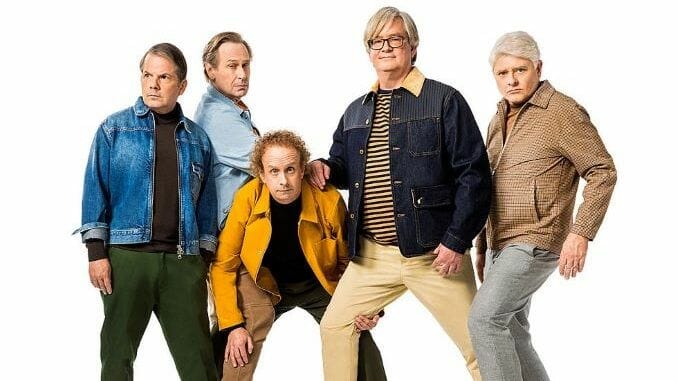Dave Foley Discusses the Return of The Kids in the Hall
Photo courtesy of Amazon
Revivals can be a tricky thing. It’s impossible to replicate all the internal and external elements that went into making something a success years after the fact, and over the last decade we’ve seen a number of once popular TV shows return to mixed results. Sketch comedy isn’t immune to those pressures, but it might be less vulnerable due to its very nature. In a way sketch is more like a band reuniting than a TV show—typically it’s a small group of creative partners who have their own process and methods that rarely reflect the nature of a TV writer’s room, all generally writing for themselves and not other performers who might not understand or agree with their ideas.
The list of sketch revivals isn’t deep, but the track record is more successful than with sitcoms or dramas, and the latest example just launched this week on Amazon Prime. The Kids in the Hall are back with a direct continuation of their beloved sketch show, which ran on the CBC and HBO from 1988 to 1995, and aired in repeats for years on Comedy Central; based on the five episodes we’ve seen, it lives up to the legacy of the original. Bruce McCulloch, Kevin McDonald, Mark McKinney, Scott Thompson, and Dave Foley have often worked together on live tours and other projects over the years, and in 2010 created the narrative-driven miniseries The Kids in the Hall: Death Comes to Town, but this is their first time they’ve made new episodes of their original sketch show since 1995. And they aren’t shy about explicitly tying the revival to that original series; the credits are an updated version of those from the ‘90s, with the same theme song from surf rock band Shadowy Men on a Shadowy Planet, only with the band and the Kids themselves all clearly a few decades older. Familiar characters from the past pop up throughout the run, although not as nostalgia; when the boss and secretaries from AT & Love appear, it’s to comment on how corporate culture has changed since the mid ‘90s, and not just for the cheap pop of recognition from the viewer. The Kids in the Hall have produced a model of how to revive a cult favorite, and the comedy world is better for it.
Paste recently talked to Dave Foley about the return of the Kids in the Hall and what it’s like to work on a new sketch show for the first time in 30 years. Here’s what he had to say, edited lightly for clarity and concision.
Paste: It’s been close to 30 years since the original show came to an end. Why was this the right time for another series?
Dave Foley: In part because somebody let us. That was big, one of the biggest hurdles is getting someone to pay for everything. But a lot of it started because in 2018 I reached out and had lunch with Britta von Schoeler at Broadway Video, and said, you know, it just occurred to me next year, here is our 30th anniversary of the start of the series. And so from that conversation near the end of 2018, here we are in 2022 celebrating our 30th anniversary, which is now three years old.
Paste: I’m guessing the pandemic has something to do with that.
DF: It did. It will do that. And just the usual Kids in the Hall efficiency of making decisions. And then once we finally did decide to get to work, which was in 2021, the pandemic came in and shut us down for a year.
Paste: So how has the process of writing and creating the show changed over the years?
DF: We complain more about young people than we used to. But other than that, it’s pretty much the same. Yeah, it’s very creepy, really, how little any of us have matured or progressed. Yeah, as artists or as human beings. So it felt very much like the old days of just getting together and throwing ideas at each other and, you know, occasionally fighting about what’s the best way to do things. And just being in tears laughing a lot of the time. Because, yeah, that’s one of the nice things about working with the Kids is we spent all those years together.
Paste: I was gonna say, you can tell by watching the new series how easy it is for you guys to sort of slip back into it because it really does capture not just the look but like the whole feel of the original series. But with a lot more nudity. I was—I was surprised by all the nudity.
DF: Yeah, and the nudity on this go ‘round is not coy at all. There’s none of that skirting the issue. You’re just getting—you’ve just got to be prepared for some penises, is what we’re saying, America. And let’s face it, America is not prepared for penises, especially that old man penis. Never old man penis. Like they’re less threatening. Yeah. Yeah, they’re less of everything really.
-

-

-

-

- Curated Home Page Articles By Test Admin October 21, 2025 | 3:10pm
-

- Curated Home Page Articles By Test Admin October 21, 2025 | 2:57pm
- Urls By Test Admin October 21, 2025 | 2:57pm
- Curated Home Page Articles By Test Admin October 21, 2025 | 2:55pm
-

-

-

-

-

-

-

-

-

-

-

-

-

-

-

-

-

-

-

-

-

-

-

-

-

-

-

-

-

-

-




































